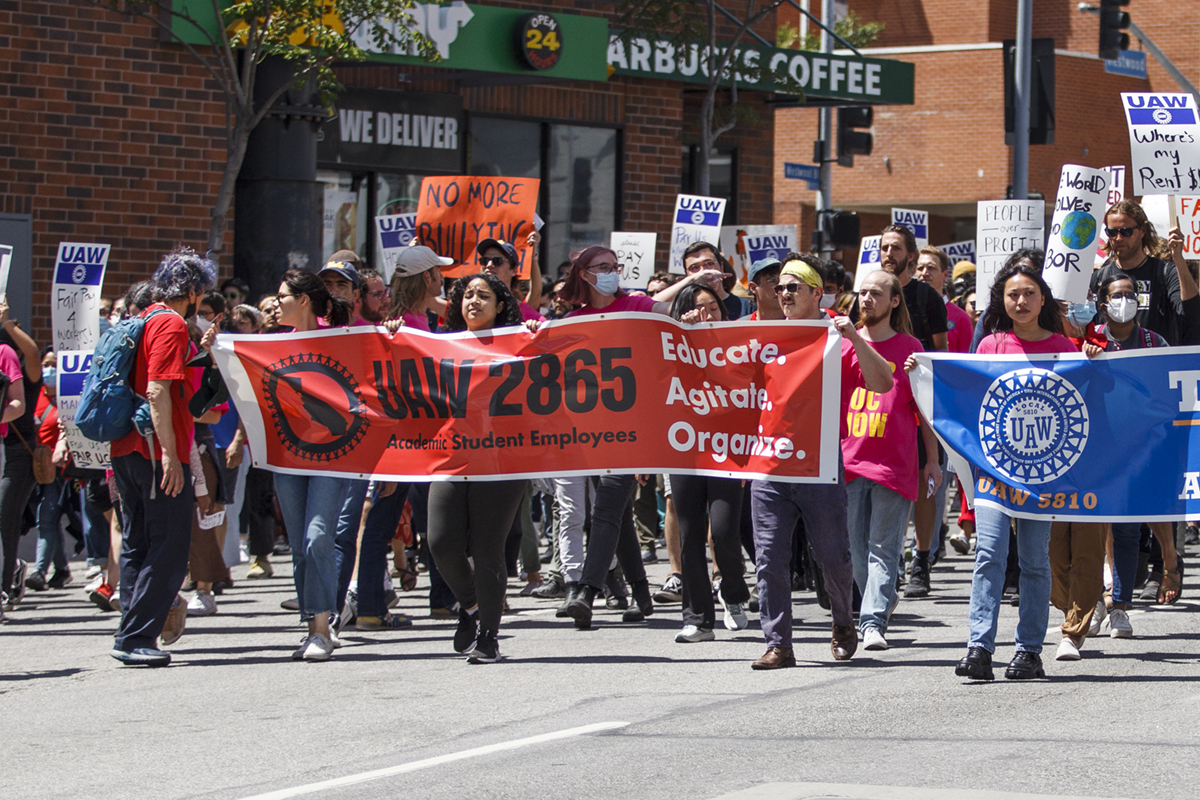Opinion: UCLA needs to give student workers more opportunities to finance their education

A student worker like first year graduate student Sunny Shah (pictured) is unable to work over 20 hours per week. (Anika Chakrabarti/Photo editor)
By Laura Gulbinas
Oct. 9, 2022 9:16 p.m.
This post was updated Oct. 11 at 5:27 p.m.
Walking through UCLA, one can’t help but notice student workers’ impact on campus. Students working in dining halls, residential areas and tutoring centers provide countless essential resources and supply UCLA with a reliable and relatively cheap source of labor.
Despite the extensive time and effort that student workers dedicate to UCLA, the university places harsh limits on the number of hours low-income students are allowed to work per week for on-campus jobs. According to the UCLA Financial Aid and Scholarships Office, students receiving work-study can work a maximum of 20 hours per week. With Los Angeles County’s minimum wage of being just under $16 per hour and UCLA’s not much better at $16.25, a restrictive limit of 20 hours per week leaves students with heavy financial burdens while juggling the many other stressors of attending college.
Because students must have demonstrated financial need to qualify for work-study, this disproportionately affects low-income students who often have the challenging responsibility to pay for their tuition, housing and meals with little to no parental contribution. On top of that, there are always more expenses for students to make out of their pockets such as buying pricey textbooks, transportation and attending social activities.
UCLA is the antithesis of cheap, and students are forced to live paycheck to paycheck with meager incomes and restricted work hours.
As the cost of living continues to increase in LA, UCLA must reconsider its employment and compensation practices by allowing students to exceed the 20-hour work limit. While it would be ideal for students to primarily focus on their academics without the financial pressure to work extensive hours, this is simply unrealistic.
Students who are desperate for additional sources of income may decide to work multiple jobs on and off campus to increase their hours and finance their education. Despite the 20-hour limit for on-campus jobs, students may end up working nearly full time when adding their off-campus jobs.
Kinjal Vyas, a fourth-year economics and psychology student, said on-campus jobs tend to be more flexible with students’ class schedules than off-campus jobs. He added that they are also generally more aligned with one’s future career plans and provide valuable experience.
Although students can choose to bypass this 20-hour limit by working off campus, on-campus jobs are easily accessible and save students invaluable time while they maintain their academics and other responsibilities such as participating in clubs and organizations.
It is essential to acknowledge that there are programs in place to support students in need of financial aid such as the UC Tuition Stability Plan, which ensures tuition costs will stay the same up to graduation. Nevertheless, tuition is still a very real concern for students with financial difficulties. With tuition for California residents at $13,804 and non-resident supplemental tuition increasing to $31,026, many students struggle to meet regular payments, obtain sufficient financial aid or navigate loans, making employment during the academic year a necessary measure.
For others, however, working part time may be prompted by a desire for independence. Chloe Jones, a fourth-year psychology student, said she wanted more hours for expendable income.
“I don’t like asking my parents for money. I just like to do things on my own,” added Jones.
Living away from home for the first time, many students are eager to claim their independence and practice self-reliance. UCLA should not hinder, but rather promote, such aspirations through a greater variety of employment opportunities free from restrictive barriers and limits.
UCLA students should have the autonomy to decide how much or little they would like to work and have the platform to speak out about their thoughts regarding employment practices that affect them.
Ricardo Vazquez, a spokesperson for UCLA, explained the university’s rationale behind the limit.
“The twenty-hour cap is a long-standing policy at higher education institutions, designed to allow students to earn income while maintaining focus on studies and work-life balance,” Vazquez said in an emailed statement.
Although the university claims to have students’ best interests at heart, the only instances UCLA seems to worry about our time and work-life balance are when they’re paying for it.
“If students dedicate too much time away from their academic endeavors, they may fall behind in classes and the pursuit of their degree objectives,” Vazquez added.
While that is a valid concern, students should be allowed to decide for themselves what they can and cannot handle, especially if their reason for working is to finance their degree.
Only with both UCLA and student workers doing their part can these detrimental concerns be addressed and students of all socioeconomic statuses be supported and equipped to succeed.





